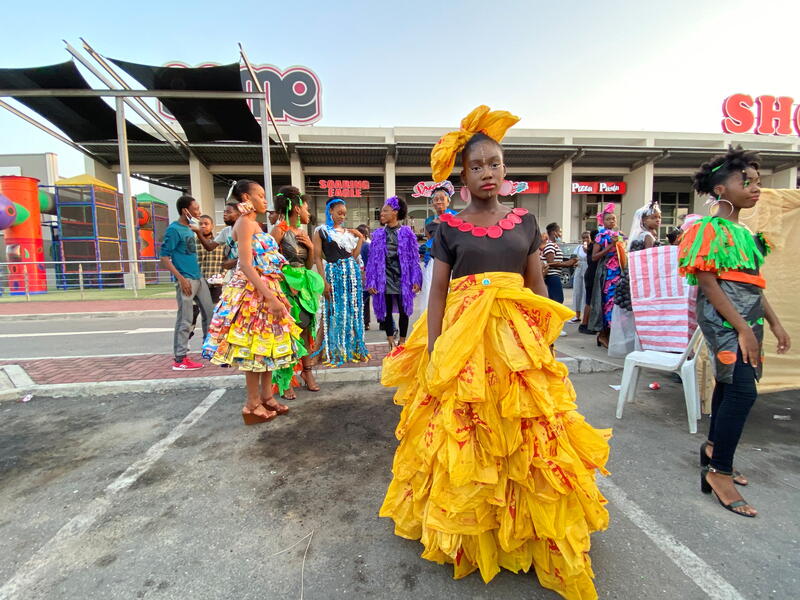This project is helping African reporters to improve their coverage of climate change

Young Nigerian climate change activists wear plastics recovered from waste, used to make garments during their annual show in Lagos. REUTERS / Seun Sanni
Zubaida Ismail, a Ghanaian freelance journalist, wanted to explore the relationship between climate change and gender in her home country, but she had no prior knowledge on how to write this kind of stories.“I realised that there is a link between climate change and gender and I wanted to learn how the impact of the crisis was contributing to the poverty levels of women and children in the rural north of Ghana,” she says.
In July 2021 Ismail applied for a new three-month fellowship on climate change reporting for journalists in West Africa. The initiative was created by the Centre for Journalism Innovation and Development (CJID), an independent Nigerian media nonprofit. Its goal was to train 16 journalists remotely, mentor them and fund them to produce impactful stories on climate change in their local communities.
Most local reporters in West Africa lack the skills and knowledge to adequately report climate change and some newsrooms are not interested in creating special desks or committing resources to this kind of coverage. CJID is trying to fill this gap by training journalists and empowering their newsrooms to cover climate issues in their local communities across the region.
“Climate change is something that affects local people the most so the gap we try to address is the gap in knowledge and capacity of journalists to report on the issues,” says Akíntúndé Babátúndé, the person leading the initiative. “It is important to close this gap so that people know how climate change affects them, and how they might hold their governments accountable on their climate promises.” As we know, Africa is one of the least contributors to the carbon emissions that fuel this crisis but sadly one of the worst impacted regions,” Babátúndé says.
How the reporting fellowship works
Any applicant needed to include a pitch or a research proposal focused on climate issues in their own countries. According to CJID, more than 800 journalists applied. The training aimed to strengthen the capacity of media and civil society to carry out deep and impactful reporting as well as advocacy around issues relating to natural resources, extractives and climate change. Before the fellowship began, CJID developed a survey to identify skill gaps and areas of intervention. The results of this survey helped them in developing their training curriculum. “We also do the same after training to be sure expectations are met,” says Babátúndé, who attended COP26 in Glasgow last year.
Ismail was one of the 16 journalists selected for the first cohort of the fellowship. She told me she had never written any story on climate change because it was not part of the topics she covered. Journalists from Sierra Leone, Liberia, The Gambia, Liberia and Nigeria also joined the inaugural fellowship programme. Babátúndé and other experts with vast knowledge on climate change trained the selected journalists.
When the initial three-day training ended, the journalists were provided with mentorship, a $200 stipend for each story produced, and editorial support. They were also expected to produce three stories during the fellowship. “It was a great experience having a dedicated mentor for the period with whom I discussed story ideas and how to write them,” Ismail says.
“With the training, I have acquired knowledge on climate change reporting and skills on negotiation and public policy engagement,” says Maryam Nije, a Gambian journalist who’s part of the fellowship and who works for The Voice, a local publication in the country.
“To the best of our knowledge, we think the journalists have been well-equipped to do stories on climate change,” Babátúndé says. “But we cannot control some other issues such as individual newsroom priorities. Our plan is to continue supporting them with data and resources to execute story ideas, and we hope fellows become climate change ambassadors in their newsrooms and in their countries.”
Producing impactful stories
Africa is at the heart of climate change discussions. The African Union’s Agenda 2063, a master plan concluded in 2013 “for transforming Africa into the global powerhouse of the future”, recognises climate change as a major challenge to the continent’s development. Babátúndé tells me that is one of the reasons why it is important for journalists to have the necessary skills to report the ongoing conversations and policy debates.
After her fellowship, Ismail produced three stories on climate change in Ghana. One focuses on tackling plastic waste in the country and on the individuals solving these problems with creative solutions by recycling waste. Last year, she was appointed as the Ghana Correspondent for China Dialogue Ocean, a publication dedicated to reporting the ocean crisis. She is currently working on a sub-regional collaboration project with other colleagues in West Africa on climate change.
In August 2021, Nije did a story on the rising sea levels in The Gambia and the threats it poses to local communities. The story showed that rising sea levels could inundate over 8% of the country’s land area, mostly people living in coastal communities. It also highlighted how the government wants to fix this problem through some interventions and a strategic framework. “We were expected to use this knowledge to shed light on the problems and solutions through evidence-based reporting,” she says.
In another story, Nije interviewed Nfamara Dampha, a climate change expert and consultant from the World Bank who explained the importance of critical investment in climate change. “I did know a little about climate change reporting before I was selected for the fellowship, but the training has deepened my knowledge,” says Nije, who has also been engaging stakeholders, experts and local communities on the challenges of climate change in her country.
In October 2021, Adejumo Kabir, a Nigerian journalist trained at the fellowship, published three stories with one of them focusing on how improper waste management contributes to the climate crisis in the country. Another story focused on flooding and on how it is displacing residents living in riverine communities in Nigeria’s Southwest region. “This is an underreported story,” Kabir tells me. “As important as climate change is, most media organisations are not really talking about it.”
The best part of the fellowship, Kabir says, was the training on solutions journalism, which helped him to learn how to highlight solutions to problems in his stories.
In 2021 one of Kabir’s stories was shortlisted for the Thomson Foundation Awards from over 200 entries from 55 countries. He currently works as Assistant Investigations Editor at HumAngle, a media nonprofit focused on reporting conflict and extremism in Nigeria and West Africa. HumAngle has a Climate Desk that evaluates information about climate change, its causes, and the ways to mitigate it.
Reporting on climate in Africa: the key challenges
It’s not easy to cover climate change in West Africa, a region where most newsrooms don't have climate change desks. Ismail told me that the lack of support from managers is a big problem. “It is difficult when your editors aren't interested in the topic,” she says. “Your story doesn't make the headlines no matter how beautifully it's written.”
“Some journalists applied for the fellowship because they are passionate about climate change, not necessarily because that is their duty,” Babátúndé says. “When editors have other story ideas to pursue, climate reporting suffers.”
In The Gambia, where climate issues are given less importance, Nije tells me that lack of resources and access to sources are some of the challenges local journalists face.
Reporting climate finance is an area most journalists find difficult to navigate. Babátúndé says the funds associated with climate change isn't something to track as a single budget line item. It is sometimes spread across other sectors of the economy and it is very difficult to track. “When you look at climate finance,” he says, “you'll see there are several components: government, private sector and multilateral institutions. And most of the time in Africa, you don't have access to data to analyse these funding or to track effective deployment. Transparency and accountability have always been a major issue in the region but we will continue to pursue it.”
Funding is another challenge. Babátúndé tells me CJID continues to work with partners to support the work of journalists working on climate change.
“As a nonprofit, you need heavy funding, which unfortunately isn't often available,” he says. “You work on a proposal for weeks or months, and eventually you don’t get the money. These things will continue to happen. But we try to ensure we activate journalists to make climate a priority so this reporting becomes central in their newsrooms.”
Despite the challenges, Babátúndé says the climate fellowship would be held every year, with journalists in the region invited to apply. CJID is now designing post-fellowship initiatives which would strengthen climate communication in West Africa and beyond.
For the next cohort of the reporting programme, CJID is working with a number of researchers in the region to produce a report on climate change on the continent.
“It is important to focus on African voices not only because it is important to improve public awareness on the continent, but because it is right,” Babátúndé says. “We activated the fellowship to ensure that African climate stories are told by African journalists.”
Ismail is confident that more training will help equip journalists to report on climate change. “I think when journalists are trained or engaged in the subject, they will see the need to dedicate attention to climate issues,” Ismail says. She thinks that journalists also need to identify the relationship between climate and other challenges in communities. “When they begin to know these issues, they will be interested in knowing how they affect all of us.”
Patrick Egwu is a Nigerian freelance investigative journalist based in Toronto, Canada where he is currently a William Southam Journalism Fellow at Massey College, University of Toronto. Formerly based in Johannesburg as an Open Society Foundation Fellow, his reporting is at the intersection of human rights, social justice, global health, migration, conflict and development in sub-Saharan Africa, and has been published by Foreign Policy, NPR, Daily Maverick, African Arguments, Rest of World, World Politics Review, Global Investigative Journalism Network and elsewhere. You can find his work here.







